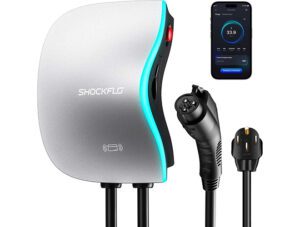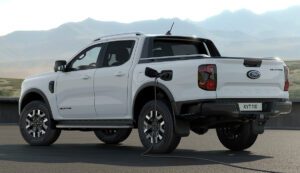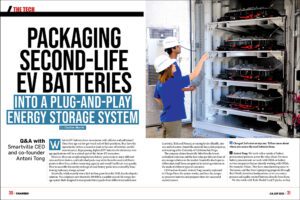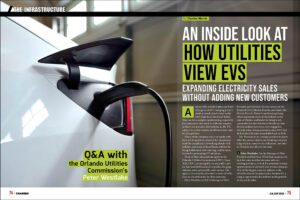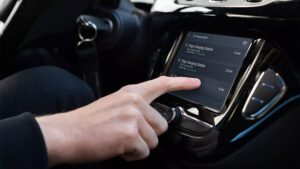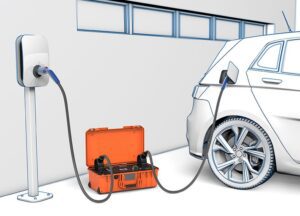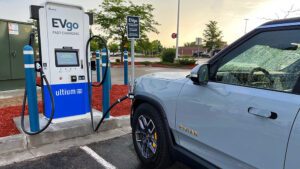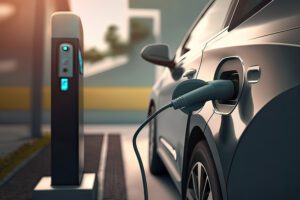Charging station manufacturer ShockFlo has released a new Level 2 residential EV charger. The S1 EV Home Charger comes in 40-amp and 48-amp versions. It includes an RFID card reader, an IP65 waterproof rating, a dedicated app and multiple installation options. Drivers can use the ShockFlo app to schedule charging times during non-peak hours, monitor… Read more »
Search Results Found For: "Plug and Charge"
Ford to launch plug-in hybrid Ranger pickup in Europe
Ford will offer customers a plug-in hybrid version of its Ranger mid-size pickup in Europe. Production is to start in late 2024, and deliveries to customers are expected to begin in early 2025. The Ranger Plug-in Hybrid sports a 2.3-litre EcoBoost petrol engine along with an electric motor, and boasts an electric range of over… Read more »
Packaging second-life EV batteries into a plug-and-play energy storage system
Q&A with Smartville CEO and co-founder Antoni Tong What do EV batteries have in common with athletes and politicians? Once they age out (or get voted out) of their positions, they have the opportunity to have a lucrative (and in the case of batteries, useful) second career. Repurposing depleted EV batteries for stationary storage applications… Read more »
An inside look at how utilities view EVs: expanding electricity sales without adding new customers
Q&A with the Orlando Utilities Commission’s Peter Westlake. Anyone who would deploy any kind of large-scale EV charging project needs to work closely (and early) with their local electrical utility. This can be a complex undertaking, especially for companies that work in different regions, as there are around 1,600 utilities in the US, subject to… Read more »
SAE International updates standard for bidirectional EV/charger communication
The SAE International Hybrid Communication and Interoperability Task Force has completed an extensive revision of SAE Standard J2847/2: Communication Between Plug-in Vehicles and Off-Board DC Chargers. This update is the first step towards the goal of enabling EV and charging station providers to use the same communication code for bidirectional DC charging, including Vehicle-to-Grid (V2G)… Read more »
EVgo and Amazon launch EV charger navigation with Alexa
US charging network EVgo has announced that drivers with Alexa-enabled vehicles or accessories like Echo Auto can now use Alexa with EVgo’s PlugShare application to locate and navigate to nearby EV charging stations. By means of a voice request, Alexa will provide a list of public charging stations nearby, along with real-time availability by plug… Read more »
How to measure EV charging power safely and accurately (Webinar)
Join this session at the fall Virtual Conference on EV Engineering, presented by CSM, where we will explain how the impact of various charging systems around the world (AC / DC chargers) with varying characteristics such as current, voltage and frequency which influence vehicle charging times can now be easily determined. CSM’s newest member of… Read more »
EVgo adds Rivian to its Autocharge+ seamless charging system
One of many complaints about public charging is that some public chargers require EV drivers to go through a cumbersome process involving apps and logins before charging. Plug & Charge, based on the ISO 15118 standard, eliminates all that, handling authentication and billing automatically when a driver plugs in. (This is basically the same feature… Read more »
Vertexcom Technologies supports V2G standard in its chipset
Vertexcom Technologies, a smart charging communication chip design company, has announced support for ISO 15118-20 Bidirectional Power Transfer (BPT), also known as Vehicle-to-Grid (V2G) transfer, in its chipsets. Vertexcom’s HomePlug GreenPHY SECC chipset MSE1021+MSEX24-i and EVCC chipset MSE1022+MSEX25-i support the implementation of ISO 15118-20 BPT. Drivers can save or make money by using electricity stored… Read more »
How big is the threat of hacking public EV chargers?
As regular Charged readers know, most folks in the EV charging field believe chargers should be online, for many reasons—remote diagnostics, user information, participation in V2G applications, etc. However, anything that’s hooked up to the net can potentially be hacked, and EVSE is no exception. A recent Wired article recounted several recent incidents in which… Read more »




